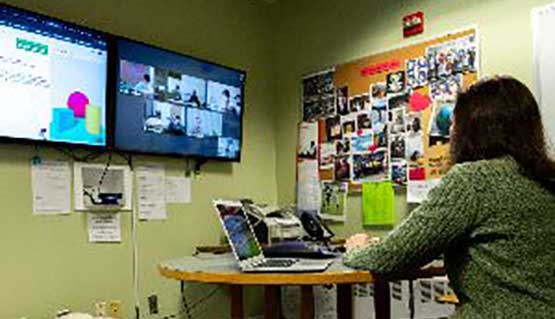A year in the making, MSON’s new Computational Thinking course, Explorations in Computer Science: Solving Multidisciplinary Problems with Computational Methods, is underway. The class is interdisciplinary, project-based, accessible to a range of students, and designed to teach computational thinking skills through problem solving in computer science.
The course is made up of several modules touching on current trends and applications in computer science: Game Design, Virtual Reality, Artificial Intelligence, Data Science, App Design, Website Design, Autonomous Cars and Robotics, Cloud Computing, and 3D Design. Each module concludes with a project in which students break down a problem into pieces, build a sequence of steps to solve the problem, and translate those steps into a digital or technological solution.
This year’s class has seven students, from grades 9-12, enrolled from five different MSON schools. The class is currently finishing up our first module on Game Design with Python. In this module, after learning the basics of the Python programming language, the students created games that address real-world issues of interest. Some of their topics are: climate change, travel to Mars, pollution, historical denialism, emergency preparedness, and binge eating disorders.
In addition to learning code and writing their games, students will read and write about current technologies, hearing from current professionals in the trades, and considering ethical issues that relate to these topics. The class has been enthusiastic about the topics so far and, in a recent survey to see which module they want to study next, they chose…Virtual Reality.
The MSON Think Tank responsible for developing this course included: Graig Marx (Science Department Chair at Winchester-Thurston School), Page Lennig (Director of Technology and CS Teacher at Waynflete School), and J.D. DeVaughn-Brown (CS Teacher at Chadwick School). It was led by Doug Bergman (CS Teacher at Porter Gaud School). Each teacher developed two of the featured modules of this course and continue to be important collaborators as each module is implemented. The Think Tank was funded through an Innovation grant from the Malone Family Foundation. Anyone at any MSON school is welcome to “follow along” with the course to learn more and consider adapting the curriculum at member schools. Please reach out to Claire Goldsmith (cgoldsmith@maloneschoolsonline.org) for more information.

